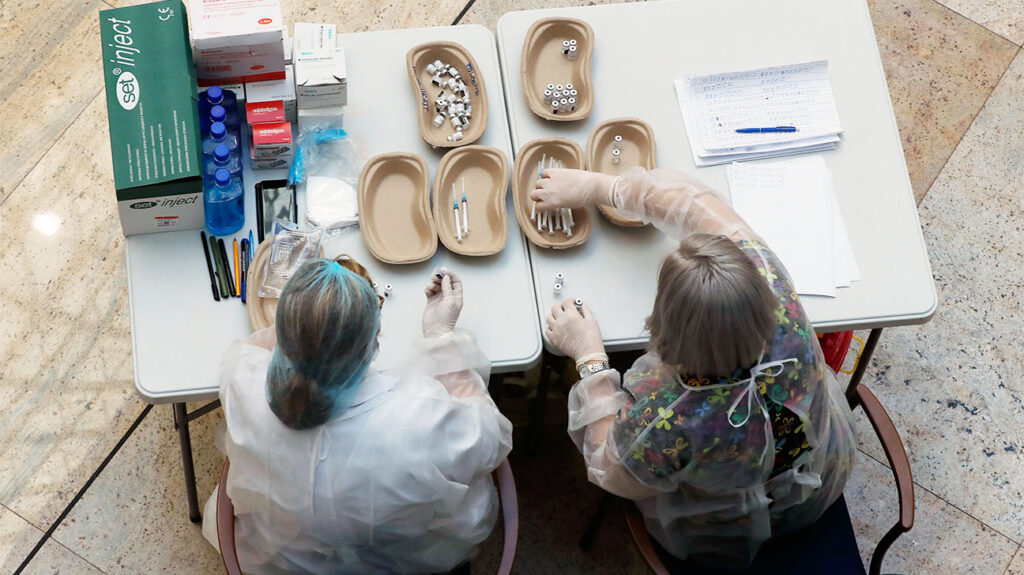COVID-19 in Romania: Doctors plea for people to get vaccinated
 Share on Pinterest
Share on Pinterest- The European country of Romania has had a record-setting surge of COVID-19.
- Romania has a low vaccination rate; only 37% of its citizens are fully vaccinated.
- The country’s healthcare system is so overwhelmed that doctors have issued an open letter describing the desperation of the situation.
- The government is offering incentives to encourage citizens to get vaccinated.
COVID-19 cases are rising in many parts of the world, and Romania has its highest case count since the pandemic began. So many people in Romania are hospitalized with the condition that the country recently reached out to the North Atlantic Treaty Organization (NATO) for assistance.
Doctors in Romania have issued a public plea, saying that they are “desperate,” as infections and deaths continue to mount, the Associated Press reports. The letter was published on the official page of CMMB, a medical professional organization based in Bucharest.
According to data from the World Health Organization (WHO), Romania’s COVID-19 case count started rising sharply over the summer.
To date, the WHO reports that Romania — a country with a population of 19 million — has had over 1.6 million cases of COVID-19, with around 46,400 of those resulting in death.
Nearly 25% of those cases were diagnosed over the past month.
In data maintained by Johns Hopkins University, Romania’s present case-fatality ratio is 2.87%. This is higher than those in other parts of the European Union (EU), such as the United Kingdom, which has a case-fatality ratio of 1.57%.
On October 10, Klaus Iohannis, the president of Romania, spoke out about the rise in cases. “I received today’s data on the pandemic. We have almost 15,000 cases. Unfortunately, we have over 330 deaths today. It’s a catastrophe,” President Iohannis said.
At present, Romania’s 7-day average rate of daily cases is almost 14,000.
Approximately 90% of patients who recently died because of COVID-19 complications had not received the vaccine.
Stephen McGrath, a Romania-based journalist who works for international media organizations and has been covering the coronavirus pandemic in the country, spoke with MNT.
“The coronavirus situation in Romania over the last month has been critical,” McGrath said.
“The country’s healthcare system has been teetering on the edge of collapse, overwhelmed with COVID-19 patients who are mostly unvaccinated. Although daily infections have now levelled off at around 15,000 new cases per day, it is still far too high and will likely continue to outpace the country’s ability to cope.”
Four vaccines are available for free to the citizens of Romania: the Pfizer, Johnson & Johnson, Moderna, and AstraZeneca vaccines.
While, on average, 75% of EU citizens are fully vaccinated, this is true for only 37% of Romanian citizens. Though this number is low, it is 10% higher than the figure 2 weeks earlier. With deaths related to COVID-19 surging, some people are now more interested in vaccination.
“Vaccinations […] are now seeing a sharp uptick, but it will still take a few months for Romania to cross the key 70% inoculation rate needed to get a handle on the local epidemic,” said McGrath.
Interest in the vaccine had previously been so low that authorities were unable to use their allotted doses. The country reportedly sold 2 million vaccine doses and donated another 1 million to prevent them from expiring.
Last month, the government introduced new restrictions in an attempt to lower the infection rate. Among these were only permitting vaccinated people and those with proof of prior infection to dine out and instituting a curfew for the unvaccinated.
The Romanian government has also launched a vaccine campaign, which includes giving meal vouchers to vaccinated citizens and entering them in a lottery for cash prizes.
Dr. Adriana Pistol, who works with Aspen Institute Romania and is the director of the National Surveillance and Control Center of Transmissible Diseases, commented on the situation in a press conference.
“With a vaccine coverage of only 30% in the general epidemiological population, you cannot control the evolution of an epidemic.”
– Dr. Adriana Pistol
The College of Physicians of Bucharest, a nongovernmental medical organization, issued an open letter to address the crisis.
“We are desperate because every day we lose hundreds of patients, who die in Romanian hospitals,” the letter reads. “We are desperate because, unfortunately, we have heard too many times: I can’t breathe… I’m not vaccinated…”
“Every day we witness tragedies: dying patients, suffering families, doctors who have reached the end of their powers,” the doctors write.
The letter describes part of the problem as a “failure of trust” between doctors and Romanian citizens. To help restore some of the public’s trust, primary care doctor Dragos Zaharia told the Associated Press that he thinks authorities should have enlisted the help of well-known personalities.
“Only anonymous guys are leading this fight,” Dr. Zaharia said.
“It’s heartbreaking for us when we know that a lot of those who died could have lived if they would have been vaccinated.”
In the meantime, the government is seeking help with treatment, as the country’s supplies are being depleted. Over the past week, Romania received 5,200 doses of monoclonal antibodies from Italy, and Hungary agreed to take on several dozen critically ill patients.
Romania also sent a request to NATO to ask for additional medical equipment, including oxygen concentrators and monoclonal antibodies.
For live updates on the latest developments regarding the novel coronavirus and COVID-19, click here.


